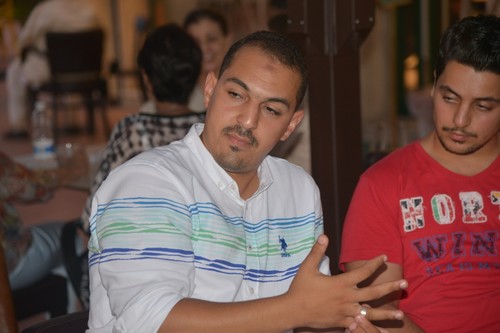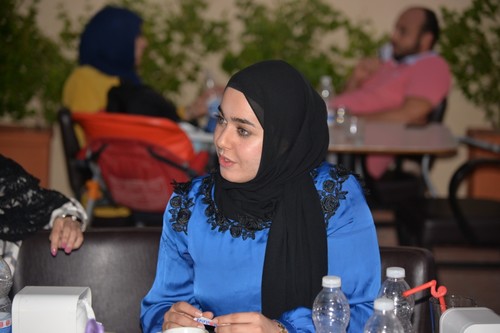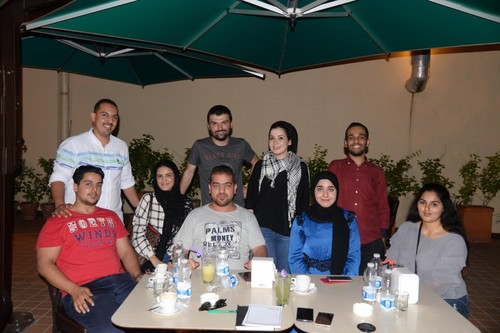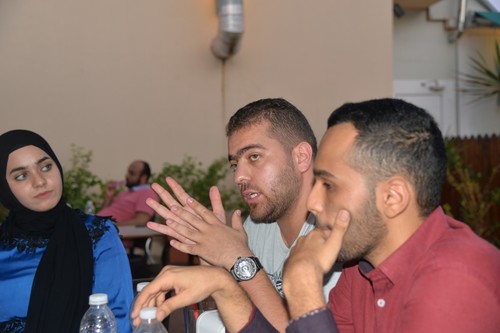© Turkuvaz Haberleşme ve Yayıncılık 2024
Two young people quarrel about the policies of the political parties that they support in Café di Roma in the Libyan capital Tripoli's al-Seyahiyah neighborhood, decorated with buildings of Italian architecture. Just like the famous expression about the Italian capital, the roads of many students, foreigners and Tripoli residents lead to this cozy café, especially during hot summer nights when electricity in apartments is cut for hours. Unlike the situation before 2011, when Col. Muammar Gaddafi had been ruling the country with iron fist, one may often witness nowadays ardent debates at such public places among Libyans regarding the course of the country.
Ola, 22, a civil engineering graduate working at an export company as a manager, was passionately defending her Democratic Party's policies toward internally displaced people, who left their homes in the southern towns surrounding Tripoli and took refuge in the Libyan capital after self-proclaimed general Khalifa Haftar launched an attack on the city on April 4.
Her debater, Nisar, 23, a civil engineering student at the University of Tripoli, argued that the Democratic Party has failed to offer Libyan citizens a shared vision for the future. "Their [Democratic Party] efforts are only directed toward winning the elections; whatever they do is only for elections," Nisar said. The Democratic Party is one of the earliest political parties founded in the post-revolution period in July 2011. Its political program relies on secularist and leftist inclinations and has cooperated with some Russian and British think tanks.
"I am a member of the Justice and Construction Party [JCP] because I believe they can save Libya from its current situation. They are the strongest political party now," Nisar said, but acknowledging the dire situation that has crippled his country's economic, social and political structures. "I have a shared ideology with the Justice and Construction Party for the future of Libya," he added.

Suhayb (left), a civil engineer working as a journalist and Nisar, an engineering student and a member of the Justice and Construction Party.
Established in 2012 in the politically free environment during the post-revolutionary period, the JCP is described as affiliated with the Muslim Brotherhood movement. After public criticism and growing Egyptian influence in Libya, some of the members of the party had abstained from openly pronouncing their affiliation with the brotherhood.
Ola continued her counter arguments, rejecting Nisar's comments on the Democratic Party. "When hundreds of people escaped to Tripoli from the war, they were placed in several schools, and I tried to work with the party's humanitarian aid campaign. We tried to make sure that these people get the relief they need," she said. For Ola, the weakness in administrative policies has led to a failure in addressing the material and psychological needs of the internally displaced people.
The Tripoli war continues to take a heavy toll in the Libyan people, destroying their lives economically and psychologically. In early July, the World Health Organization (WHO) Libya mission reported that the fight around Tripoli had cost 1,048 lives, including 106 civilians, and injured 5,558 people, while more than 100,0000 people left their homes behind and came to the capital city.

Ola, a young Libyan civil engineer who works as a manager at an export company.
Some of these people have taken refuge in the homes of their relatives, and others were placed in either schools or centers. However, Libya's Education Ministry has begun the evacuation of schools to maintain the structure of the academic year.
"People staying at these schools protested against the evacuations. In a school where I worked voluntarily, Shahada al-Asema School, some of the families resisted the evacuation and during the melee, a woman was shot and she had to have surgery," Ola narrated with difficulty, holding back tears. Ola no longer goes to the schools or any other center where families are kept. "I cannot deal with what I have witnessed anymore," she said, recalling the story of a woman who had nowhere to go after escaping her hometown and was sexually abused.
With all her aspirations and dreams for the successful implementation of revolutionary reforms, Ola's ideas are the embodiment of a large part of Libyan youth. "Young Libyans are trying so hard to reduce the suffering of the people who are affected by the war, but it feels like those efforts will lead to nothing since the war is not a local war, it's an international proxy war that keeps escalating, which makes the efforts of young people almost nothing in front of those global powers," Mohammed, 20, a political science student at the University of Tripoli, said.
One country, one nation, two governments
In her explanation of the reasons why people in southern cities migrated to Tripoli though most of them support Haftar's militia, Ola argued that Haftar cannot provide them any mechanism or structure to sustain their lives. "Despite its deficiencies and some setbacks, Tripoli still has a structured and internationally recognized government; therefore, people choose to come here," she remarked.
The Tripoli administration, dubbed Government of National Accord (GNA), was established in December 2017 with the signing of the Libyan Political Agreement (LPA) in Morocco at the end of a political process mediated by the United Nations. Currently, the country is torn between the U.N.-recognized GNA – presided over by the Presidential Council – and the Tobruk-based House of Representatives (HoR), supporting Haftar and his militia. Since the summer of 2014, political power has been split between the two rival governments in Tripoli and in Tobruk.
Efforts to finally capitalize on much-needed reforms along with political and economic stability were halted by the civil war that erupted in May 2014, when Haftar managed to convince foreign backers to fight Daesh terrorists in Benghazi
and later expanded the attacks into countrywide aggression. Seizing most Libyan territory from the east to the south with military and political support from Russia, Egypt, the United Arab Emirates (UAE), Saudi Arabia and France, Haftar is now battling GNA forces with the goal of taking full control of the country and instituting a military regime – one that is no different from that of Gaddafi.
Despite the protracted armed conflict between two rival governments in the North African country, Libyan people are trying to maintain the ordinary course of their lives, Zakariyah, 25, a young telecommunication engineer, said.

Daily Sabah Editors Elif Erşen and Mustafa Kırıkçıoğlu at a gathering with young Libyans, Tripoli, July 31, 2019.
"We had been trying so hard to accomplish what have yearned for so long. The revolution of 17 February gave the Libyan youth and its people a different vision for the future," Ola said and continued, "Just as we were trying to see some stability in 2014, things had changed drastically."
Ola, who also has a double major in political science, disappointedly acknowledged that everything she studied in political science textbooks is applicable in real life, referring to the unresolvable problems in her country.
Different fractions in Libya have been trying for reconciliation to unify different administrations in the east and west as well as different militia groups, Zakariyah observed. "Unfortunately, the efforts and negotiations were disrupted with the April 4 Tripoli war," he said and sadly sighed, "I think the fighting will continue maybe for another six months or a year. After that, Libya will be separated into two."
Zakariyah's comments received an immediate reaction from Nisar, the young member of the JCP. "Separation of Libya is impossible. Our country is a mixed-up society. While some family members are living in Tripoli, others are residing in the east of the country," he said and argued that there is no military solution to the Libyan conflict. "The only way out from this international proxy war is the political solution. The Haftar militia has to go back to where they came from, the east."
In the same vein as Nisar, Suhayb, 25, a young journalist who studied engineering at the university, also said: "This conflict will not stop until foreign intruders secure their interests. As the conflict grows, their interests also grow. Therefore, the solution must be political."
Mohammed, the young and aspiring political science student, jumped in and maintained that Egypt is key to the Libyan conflict. "If anything changes in Egypt, it will have a broader impact in Libya and the region. To ensure political stability in Libya, first the Egyptian policy must be changes," said Mohamed, who is a successful international debater having represented his country abroad and winning several awards. "The rise of
Sissi somehow triggered the rise of Haftar," he said, indicating that Cairo sees Libya as its backyard and therefore its policy on Haftar will not change.
"Algeria and Tunisia are good examples, and now, there is struggle to establish democracy in Sudan. Eventually, it will affect Libya in a good way," the young debater added.
The Arab streets started to simmer following widespread demonstrations in 2011, referred as the Arab Spring in international media, and that resulted in strongmen in Egypt, Tunisia and Libya stepping down in a short time. Even though the majority of Arab rulers maintained their position during demonstrations, some were shaken by aftershocks, and longtime rulers such as Abdelaziz Bouteflika and Omar al-Bashir recently lost their seats respectively in Algeria and Sudan.
The phenomenon created unique situations for each country; in Tunisia, for example, people witnessed a successful transition to a democratic system after the immediate ousting of Zainal Abidin bin Ali in 2011, and Beji Caid Essebsi was elected president in 2014. However, in Egypt, even though Hosni Mubarak stepped down in 2011 after demonstrations, another military coup ousted the country's first democratically elected president Mohammed Morsi in 2013, and the coup leader Abdel-Fattah el-Sissi established an authoritarian rule resembling Mobarak's regime.
The youth has strong vision for Libya

Mohammed (front), a young student studying political science at the University of Tripoli and Zakariya, a young telecommunication engineer.
When asked why everyone is a graduate of engineering though they are deeply involved in political debates, Rawassei, 22, a graduate of dentistry and a journalist, said, "Because Libyan families value so much medicine, pharmacy and engineering. They want their children to be doctors or engineers." She also brought up a very interesting point: It was merely impossible to study social sciences during the Gaddafi era. "The tradition of going to natural sciences, medical school or engineers during the Gaddafi time still dominant in the Libyan society," she added.
"I wanted to study political science during Qaddafi time, but it was not a practical major," said Zakariyah, implying the situation during Gaddafi's rule lent no room for opposing political ideas.
Like many instances in the Arab world, the Libyan strongman limited the political area to a private sphere for his family and entourage after he seized power with a military coup in 1969, toppling then-Libyan King Idris al-Senussi.
During his 42-year rule, Gaddafi held the reins of the North African country and reportedly was preparing his son Saif al-Islam as his successor. However, the revolution in 2011 changed the entire conjuncture and an abundance of political parties mushroomed following the step down and lynching of Gaddafi in northern Sirte province by an indignant crowd. However, many of those parties disappeared in time or merged with others to garner broader support from the people.
"We need more political scientists, especially such times of crisis," said Mohammed. He is regarded as luckier than Zakariyah for enrolling in university after the revolution, at a time when free speech had become wider spread compared to the past. During the Gaddafi era, social sciences were considered enemies of the state. "You know the Greenbook?" Mohammed asked and said, "It was the constitution, and it was the social science for Libya."
Despite having financial difficulties on printing expenditures, Libya has many newspapers from different political spectrums; however, the rise of another strongman, Haftar, threatens all the achievements of the revolution again. His emergence in 2014 as a significant actor has deepened political fissures and culminated in a split of political power between two rival governments in Tripoli and in Tobruk. The general has already flexed his muscles against the internationally recognized government in Tripoli, aiming to destroy all political processes and establish a one-man regime similar to Gaddafi's. His ambition has instigated military conflicts between the two rival governments, tarnishing hopes of a stable political transition.
For students, there is another significant problem posing a threat to the country's democratic course as much as the rise of Haftar: the "old faces" in the government. "There is no constitution yet in the country, and it is difficult to talk how the government is structured, because same people in the offices," Zakariyah said.
Ola also shared Zakariyah's views on the country's course for democracy. Bursting with excitement and hope in the first years of the revolution, Ola's views have changed over time due to unsolved chronic problems, such as electricity cuts.
The problems have even created sympathy for the old regime in parts of society. Sara, an architecture student studying in a private college, cherishes the memory of the Gaddafi era. "At least we had dignity and sovereignty at that time because he was a strong man. Now, nobody cares about Libyans anymore," she said.
On this issue, Mohammed agrees with Sara. "Libyans were respected, maybe sometimes not in a very good way but still we were," he said.
However, Zakariyah objected the logic of comparison between two times. "You cannot compare them Qaddafi and PM [Fayyez] el-Sarraj. The current government has pressure on itself, facing with opposition, rebellion and terrorists," he argues. He also asserted that some people in the government are "accomplices with anti-revolutionary forces."
"The Libyan youth has great potential, but even our achievements are not recognized by the government. As international debaters, we have received many awards, yet no acknowledgement from the administration," Mohammed said with remorse.
The Libyan youth initiated the movement against Gaddafi in February 2011. Their demand for free speech, freedom, democracy and a civil government led to the overthrow of the 42-year rule of Gaddafi's authoritarian regime.
One of the drivers of the early uprising was the Shabab Libya, also known as the Libyan Youth Movement. It originally started off as a Facebook group, before organizing a protest on Feb. 17, 2011. They quickly became a mainstream source of news, images and videos from Libya. They acted as a unified voice for the people.
Eight years on, the Libyan youth still have the same desires and progressive vision for their country, aspiring to become the inspirational force for a democratic and prosperous Libya.
